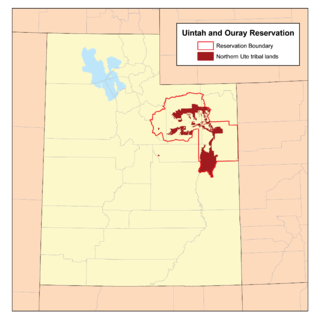Uintah and Ouray Indian Reservation

The Uintah and Ouray Indian Reservation is located in northeastern Utah, United States. It is the homeland of the Ute Indian Tribe, and is the largest of three Indian reservations inhabited by members of the Ute Tribe of Native Americans. It lies in parts of seven counties; in descending order of land area they are: Uintah, Duchesne, Wasatch, Grand, Carbon, Utah, and Emery counties. The total land area is 6,769.173 sq mi (17,532.078 km²) with control of the lands split between Ute Indian Allottees, the Ute Indian Tribe, and the Ute Distribution Corporation.[1]
The tribe owns lands that total approximately 1.2 million acres (4,855 km2) of surface land and 40,000 acres (160 km2) of mineral-owned land within the 4 million acres (16,185 km2) reservation area.[1] Other parts of the reservation are owned by non-Ute, as the tribe lost control of much of the land during the allotment process.
As of the 2000 census, a population of 19,182 persons was recorded as living on the reservation . This is the second-largest Indian reservation in land area in the United States, second to the Navajo Indian Reservation, but control of the land is split among multiple authorities. Tribal headquarters are in Fort Duchesne, located in Uintah County, Utah. The largest community within the reservation boundaries is the city of Roosevelt. Most of its residents are not Native Americans.
Jurisdiction and land claims
The tribe has had longstanding issues with state and county authorities, who since the 1970s had prosecuted in state court Ute members from within the tribal lands at this reservation and its two other holdings. The tribe filed suit against the state in federal district court. In Ute Tribe v. Utah (10th Cir. 1985) (en banc), known as Ute III, the US Tenth Circuit Court of Appeals upheld the tribe's legal jurisdiction over its members within the reservations and affirmed the boundaries, against the state and counties' claims that the area of jurisdiction had been reduced since the reservation was established in 1864. The United States Supreme Court declined to hear the case.
The state continued to prosecute Ute within the reservations in state court, in violation of the ruling in Ute III. The state Supreme Court ruled the reservation boundaries had been reduced, and the case was heard by the US Supreme Court, Hagen v. Utah, 510 U.S. 399, 421-22 (1994). It upheld the Utah Supreme Court in affirming that some congressional actions had diminished the boundaries of the Uintah Reservation, but that the two other reservations were not affected.
In an effort to reconcile the cases in light of the Supreme Court's ruling, the Tenth Circuit Court of Appeals reviewed Ute Tribe v. Utah in 1997.
"So in a decision the parties call Ute V, this court elected to recall and modify Ute III’s mandate. See Ute Indian Tribe v. Utah, 114 F.3d 1513, 1527-28 (10th Cir.1997). Because Hagen addressed the Uintah Valley Reservation, Ute V deemed that particular portion of Ute tribal lands diminished — and diminished according to the terms Hagen dictated. So much relief was warranted, this court found, to “reconcile two inconsistent boundary determinations and to provide a uniform
allocation of jurisdiction among separate sovereigns.” Id. at 1523.
The state and counties continued to prosecute Ute from within the reservation for offenses in state courts. The Tenth Circuit Court of Appeals called the plaintiffs and defendants together again in 2015. The court rejected the counties claim to be acting as an arm of the state and entitled to the same immunity. It strongly advised the state and counties to observe the settled nature of this case and to refrain from their tactics to challenge the boundaries of the reservation and jurisdiction of the tribe over its people in "Indian country."
Communities
See also
- Ouray National Wildlife Refuge
- Southern Ute Indian Reservation
- Uinta Indian Irrigation Project
- Ute Mountain Ute Indian Reservation
References
- 1 2 UINTAH AND OURAY RESERVATION (PDF) (PDF), Bureau of Indian Affairs, n.d.
- Uintah and Ouray Reservation and Off-Reservation Trust Land, Utah United States Census Bureau
External links
Coordinates: 40°27′28″N 110°10′53″W / 40.45778°N 110.18139°W
